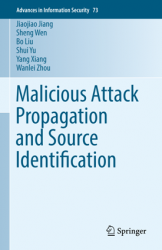Malicious Attack Propagation and Source Identification
- Добавил: literator
- Дата: 26-09-2019, 19:27
- Комментариев: 0
 Название: Malicious Attack Propagation and Source Identification
Название: Malicious Attack Propagation and Source Identification Автор: Jiaojiao Jiang, Sheng Wen
Издательство: Springer
Год: 2019
Страниц: 192
Язык: английский
Формат: pdf (true)
Размер: 13.5 MB
In the modern world, the ubiquity of networks has made us vulnerable to various risks. For instance, viruses propagate throughout the Internet and infect millions of computers. Misinformation spreads incredibly fast in online social networks, such as Facebook and Twitter. In essence, all of these situations can be modeled as a rumor spreading through a network, where the goal is to find the source of the rumor so as to control and prevent network risks. So far, extensive work has been done to develop new approaches to effectively identify rumor sources. However, current approaches still suffer from critical weaknesses. The most serious one is the complex spatiotemporal diffusion process of rumors in time-varying networks, which is the bottleneck of current approaches.
The second problem lies in the expensively computational complexity of identifying multiple rumor sources. The third important issue is the huge scale of the underlying networks, which makes it difficult to develop efficient strategies to quickly and accurately identify rumor sources. These weaknesses prevent rumor source identification from being applied in a broader range of real-world applications. This book aims to analyze and address these issues to make rumor source identification more effective and applicable in the real world.
Typical malicious attacks include viruses, worms, Trojan horses, spyware, adware, phishing, spamming, rumors, and other types of social engineering. Since the first computer virus surfaced in the early 1980s, malicious attacks has developed into thousands of variants that differ in infection mechanism, propagation mechanism, destructive payload, and other features. According to the types of cyber threats that contributed to breaches, malicious attacks are divided into two main categories: malware and social engineering.
Motivated by extraordinary financial or political rewards, malware owners are exhausting their energy to compromise as many networked computers as they can in order to achieve their malicious goals. A compromised computer is called a bot, and all bots compromised by a malware form a botnet. Bot-nets have become the attack engine of malicious attacks, and they pose critical challenges to cyber defenders. As many security reports indicate—attack numbers are quickly increasing worldwide, reaching new, unbelievable peaks.
The authors propose a novel reverse dissemination strategy to narrow down the scale of suspicious sources, which dramatically promotes the efficiency of their method. The authors then develop a Maximum-likelihood estimator, which can pin point the true source from the suspects with high accuracy. For the scalability issue in rumor source identification, the authors explore sensor techniques and develop a community structure based method. Then the authors take the advantage of the linear correlation between rumor spreading time and infection distance, and develop a fast method to locate the rumor diffusion source. Theoretical analysis proves the efficiency of the proposed method, and the experiment results verify the significant advantages of the proposed method in large-scale networks.
This book targets graduate and post-graduate students studying computer science and networking. Researchers and professionals working in network security, propagation models and other related topics, will also be interested in this book.
Скачать Malicious Attack Propagation and Source Identification
[related-news] [/related-news]
Внимание
Уважаемый посетитель, Вы зашли на сайт как незарегистрированный пользователь.
Мы рекомендуем Вам зарегистрироваться либо войти на сайт под своим именем.
Уважаемый посетитель, Вы зашли на сайт как незарегистрированный пользователь.
Мы рекомендуем Вам зарегистрироваться либо войти на сайт под своим именем.
